The absolute definitive van life guide to end all other van life guides. Get ready for a life on the road!
What was previously the symbol of a life in shambles is now one of the most sought after and envied ways of living – in a van, by the river.
It seems to be THE thing to do right now. So popular in fact, that many places across the globe are having a real epidemic of van dwellers. Whether it’s the weekend warriors, multi-week road trippers or those people that live the full-time van life. People are buying into the idea of living in a vehicle for a nomadic existence, without considering the basics such as waste management, water supply and hygiene, amongst other things. Thus causing the very essence that draws people –the beauty of nature, the freedom to travel, a life with less– to become tarnished by garbage, waste and hypocrisy.
But fear not.
For those wide eyed dreamers sitting at home, fantasising of the days when you too can be experiencing the open road. With all your worldly possessions crammed into a small cube no more than an arms reach behind you, like a bumbling turtle or a snail on the move; yet don’t really know where to begin or how to even live like that – need not worry! For I have written this ULTIMATE GUIDE FOR VAN LIFE & MULTI-WEEK ROAD TRIPPIN’ just for you.
Preface: this van life guide is written on the assumption you will be travelling in a car or van. Not an RV or fully self-sufficient vehicle
If you’re still a few steps behind and haven’t got a van conversion and don’t know where to begin, well I have an 8 step guide on how to do just that too.

The Way of the Van Life
Before we get into the meat, you must first understand the mindset. The psychological head space that will set you up for success on the road.
You must learn The Way.
The simple life. The life of a minimalist. A life stripped back to its bare bones. A journey where there are no guarantees, no directions, no numbers to call; there’s no inflight entertainment or chilled refreshments and you may well be kicked out of your room at 3:30am for no reason other than someone said so.
Your neighbours may be arsehole. A truck might pull up and stay idling for an obnoxiously long time. It’s going to be too hot and then too cold. You are going to lose everything you own even though you only own 12 things and live in a box, to then find each thing again 4 days later in the original place you thought it would be.
You are going to love every minute of it.
Every item own must serve some sort of immediate purpose in order to justify its existence and the space it takes up. If it doesn’t? Sell it. Gift it. Get rid of it or have a damn good reason for keeping it.
You will be faced with many challenges. These need to be met with an open mind and an adventurous spirit. I’ve been kicked out of camping spots at early o’clock in the morning and have driven off with a smile on my face. It’s all part of what makes it what it is.
There is beauty in the chaos, find it and you have found The Way.

Where do you sleep?
Freedom Camping
This is the practise of camping in areas that are not specifically designed or set up as established campsites. The key here is the first four letters, ‘free‘. Free in every sense, you don’t have to pay for the spot and you are free to do as you please. In my opinion, this is the best and the ultimate goal of van life.
If you put in some effort, you can find some real treats. Incredibly scenic, fantastic views and the entire place all to yourself.
The draw back is that these spots rarely have any facilities, so you’ll need to be on top of those areas yourself.
Where do you find ‘free camping’ spots?
Apps
There are a number of great, crowd sourced apps out there that are very reliable. These apps will access your location, search your area and come up with various pins that other people have put in. You can then check out the spot, read reviews left by other campers and see what facilities, if any, are available. Some apps even offer photos.
The issue is that particularly in the more popular areas, these spaces can fill up, as more and more people are relying on these apps and are therefore all being sent to the same places. If you do this, get there early to bag the flattest parking spot. And be nice to everyone else that arrives, it’s not your space after all, you were just first.
Logging & Forest Service Roads
Wild, scenic and solitary. A good logging road really can be the jackpot. The US alone has 380,000km of forest service road. These roads are often public use, when a company has finished logging, the government leave them open for recreational activities.
It is important to read the signs upon entry as it will tell you whether it is still in active use. These ones are best to be avoided. There will be extremely large, heavy trucks hurtling down unexpectedly. Some have a radio channel at the gate which will allow you to broadcast your position as you move up.
However, if you find an inactive logging road then you are golden. The roads lead for miles and miles, with large pull outs sporadically placed – perfect for parking up and setting camp. There is obviously an abundance of firewood.
Trail Heads
Hiking trail parking lots make great campsites. People leave their vehicles there for days on end all the time. Almost all of them have composting toilets as well.
Sneaky Spots
Sneaky spots are any overnight places where you probably shouldn’t be there. You can only really get away with this if you have a ‘stealth camper’. Housing areas, car parks, quiet country roads etc. These are the spots where you pull in late and leave early. Don’t be surprised if the police or security come a knocking.

Other Place to Sleep
Friends House
Staying outside a friends house gives the safety of knowing you won’t be moved on and have somewhere to hang out. But don’t be the weirdo that never leaves.
RV / Campsite
Paid camping areas are available all over the place. The more scenic the location, the more campsites you’ll find.
Walmart
Every van dwellers safe haven! Toilets, food, free wifi… and you wouldn’t be the only person walking around in slippers and a dressing gown. Walmart seems to have opened its sweet embrace to the van community, allowing the free folk to crash overnight in their carparks. At least they had done. Now some stores, particularly nearer cities, no longer allow overnight parking. You may need to drive out of town to be left in peace. Always check for signs in the carpark to warn you.
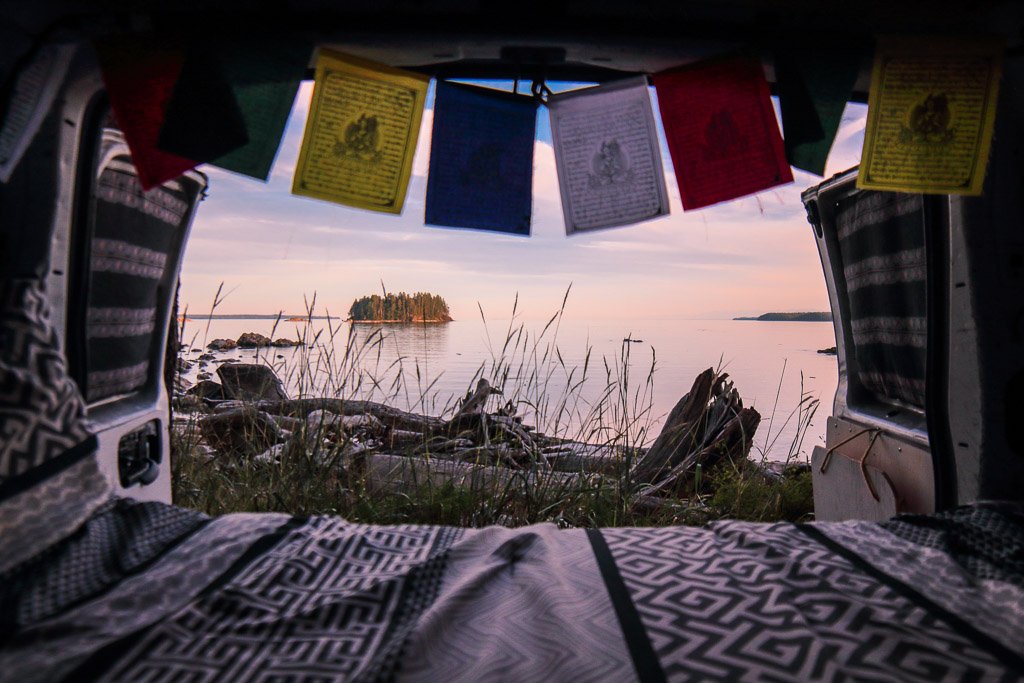
How Do You Poop in a Van?
This is usually the question that I can see people thinking about when I mention I am living in a van. The cogs are turning behind their eyes as they try to figure this one out.
And now, I am pleased to announce, after 8 months of living in a van… I have not pooped inside it a single time.
Many people do however. There are various setups that can make this work, as hassle and gross free as possible (like this one). But unless you have IBS or an issue shitting the bed at home, I really don’t think it’s necessary to go into. Because there are better options:
- public washrooms
- fast-food chains (free wifi, cheap coffee and bathrooms cleaned every 30mins)
- gas and service stations
- any cafe or restaurant if you purchase something
- ferry terminal (big up BC Ferries)
- trailheads and recreational sites / provincial parks
- library (free wifi)
- gym
- nature dump! Be sure to follow LNT – see last section for reference
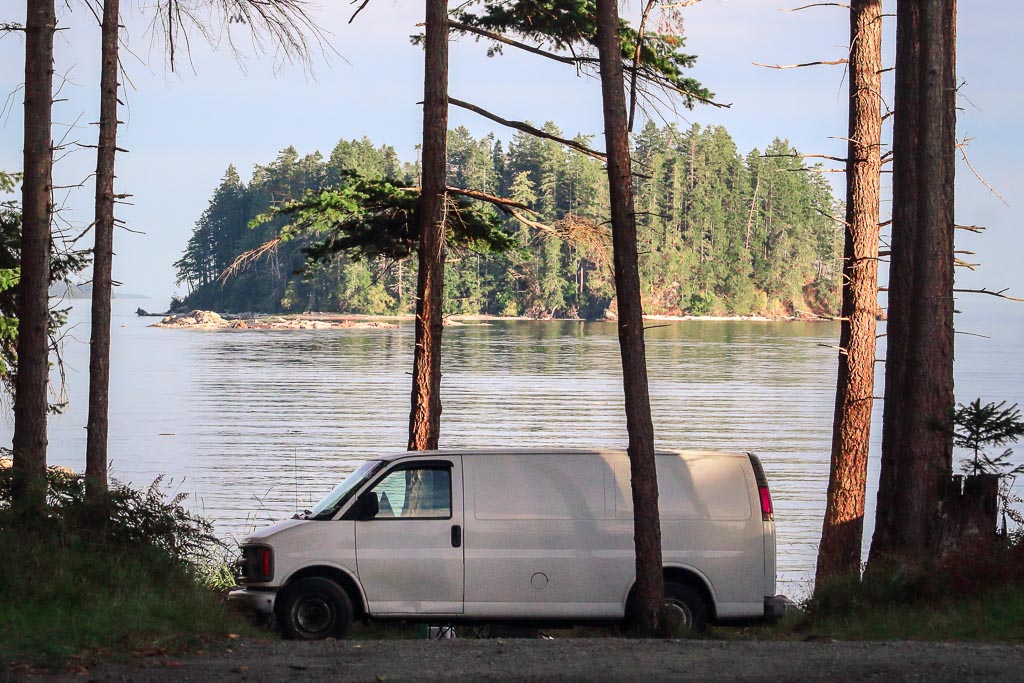
How do you Shower in a Van?
First of all, absolutely yes please do still shower you filthy animals. This article is about helping people live as comfortably as possible, without furthering any stereotypes that come with living the vehicular life.
Camping Shower
Camping showers are these large sacks that hold a decent amount of water. The sack has a tube coming off of it with a shower head at the end and a clamp to shut off the water. The sack can be left on your dashboard whilst driving to absorb heat from the sun. When it’s time to shower, find a nice private spot, hang the bag off of a tree or off the corner of your door and away you go. Each bag is good for 2-3 showers and it gets very hot. You can even buy a portable shower cubicle if you aren’t so keen on accidental exhibitionism.
These work great for post-hiking or beach showers. When you don’t really have time or energy to get somewhere else, but need to wash off.
Campsites
Every paying campsite will have a shower block. This is an inexpensive option if you want a decent wash, usually just a few dollars for shower access. You absolutely under no circumstances should park up nearby and just walk in without paying. That’s something you should definitely not do, no matter how busy it is and how they will never even notice…
The Gym / Bouldering Gym / Swimming Pool / Rec Centre
If you plan on staying in one area for a long time, getting a gym membership will really pay off. You’ll have access to all the facilities any time you need as some gyms are open 24/7. Even if you aren’t staying locally, most drop in charges are less than $10, you can workout/climb and not stink.
The River
There really is no fresher feeling than washing off in the river. Glacier fed, mountain streams, clear clean water. Be sure to use environmentally friendly products and allow them to drain through the ground first before entering the water. Also be aware of what’s down stream. Don’t wash off above someones campsite or water supply.
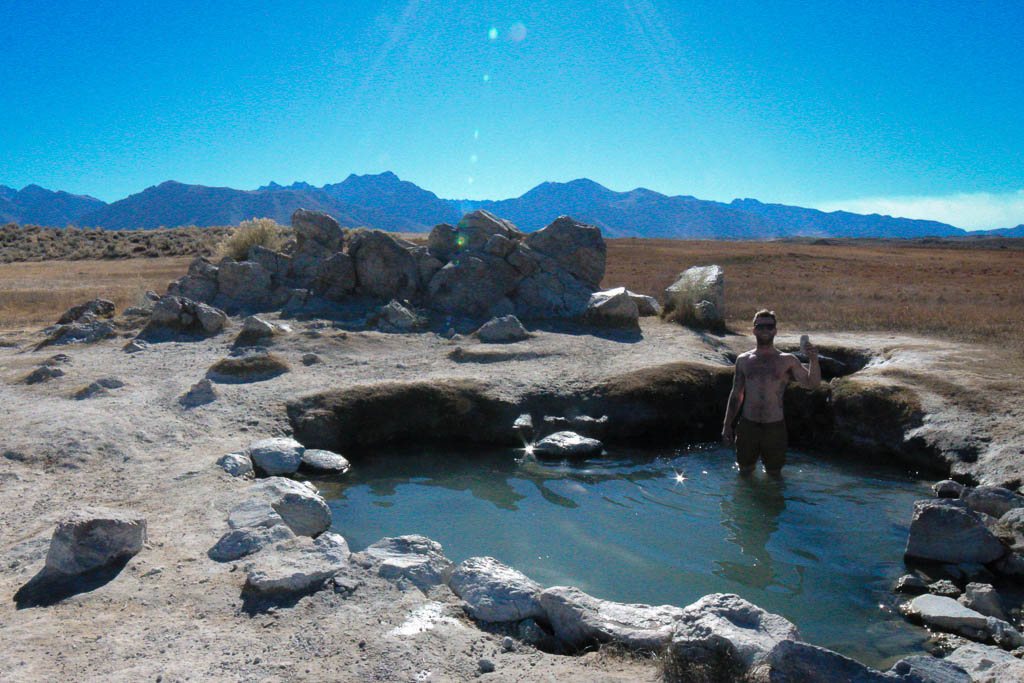
What Food Do You Eat When Living in a Van?
Living in a van or going on a long haul multi-week road trip will require some food planning. The environment you are living in will ultimately affect how long you can store food. Will you be in the baking sun all day? Is there snow and frost on the ground in the morning?
Here are a few top tips that I figured out that may be some help to you:
- Buy a cool box. It works great even just for storage. If you’re in a cold climate you can pack it full of snow. Remember to clean and air it out once in a while though!
- Fresh vegetables last 3 – 5 days if kept out of the sun.
- Nondairy milk is fine too.
- Canned tuna is a staple food source. High protein, cheap, many flavours to choose from and doesn’t need to be refrigerated.
- Cut out the meat, it is too difficult to store and will be wasted. Except on your shopping days. You can buy frozen meats which will thaw out by dinner time. The frozen pack also helps cool your cool box in the process.
- Wraps are more versatile than bread loaves. They also take up less space and last longer.
- Boil excess water in the morning. It will go in your coffee, your oatmeal and then the washing up after.
- Oatmeal. Warm, tasty, lasts forever.
- Do the washing up immediately.
- Have a rainy day plan. If it’s pissing down or super windy, what are you going to do? Usually the best option is to just go to a restaurant. Treat yourself and avoid the inconvenience.
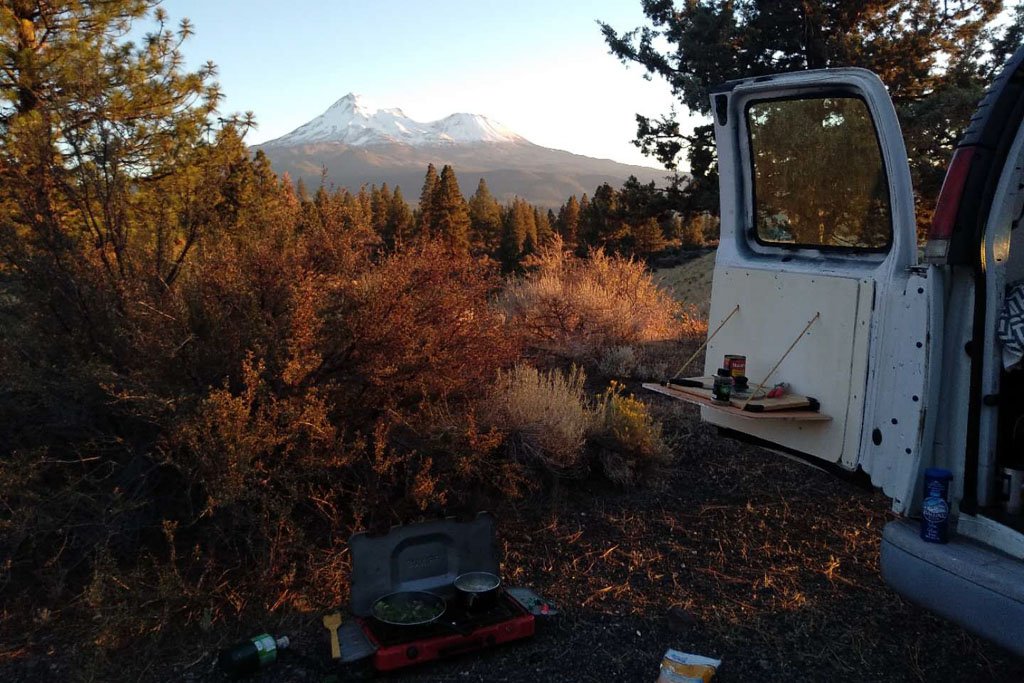
Where to Find Water During Road Trips?
You can never have enough water storage. I spent some time with just x1 20L water container. It meant that I was almost constantly on the search for the next top up to avoid running dry. This sucks. Buy two of them and stop living on droplet rations like a drought ridden savannah.
Water is a precious commodity and you must learn to never waste it.
Example: The excess boiled water for your morning coffee can be used for oatmeal and for the washing up afterwards. 1 boil = 3 uses.
At times you may feel like all you ever do is scour the lands for water. So here are some great places to look! Also, don’t ever, ever buy it. There’s absolutely no fun in that.
- National Parks & hiking areas. Lots of them have drinking water taps.
- Ranger Stations. Again, most ranger stations will have drinking water. They are also some of the most friendly people and will no doubt let you top up in the staff room if need be.
- Visitor Centres. If they don’t have water onsite they will certainly know where does.
- Cafes & Restaurants. Anytime you buy a coffee or a meal, bring your reusable bottle and ask for a top up. It’s not much, but why waste the opportunity?
- RV refuse sites. There are locations for RVs to dump grey water that also have drinking water top ups.
- RV & Campsites.
- Friends house. Don’t ever, ever leave your friends house without a top up.
- Rivers. Technically all water that’s touched land should be treated in some way. You be the judge. Mountain stream water is delicious. You can use purification tablets or something like a Life Straw.
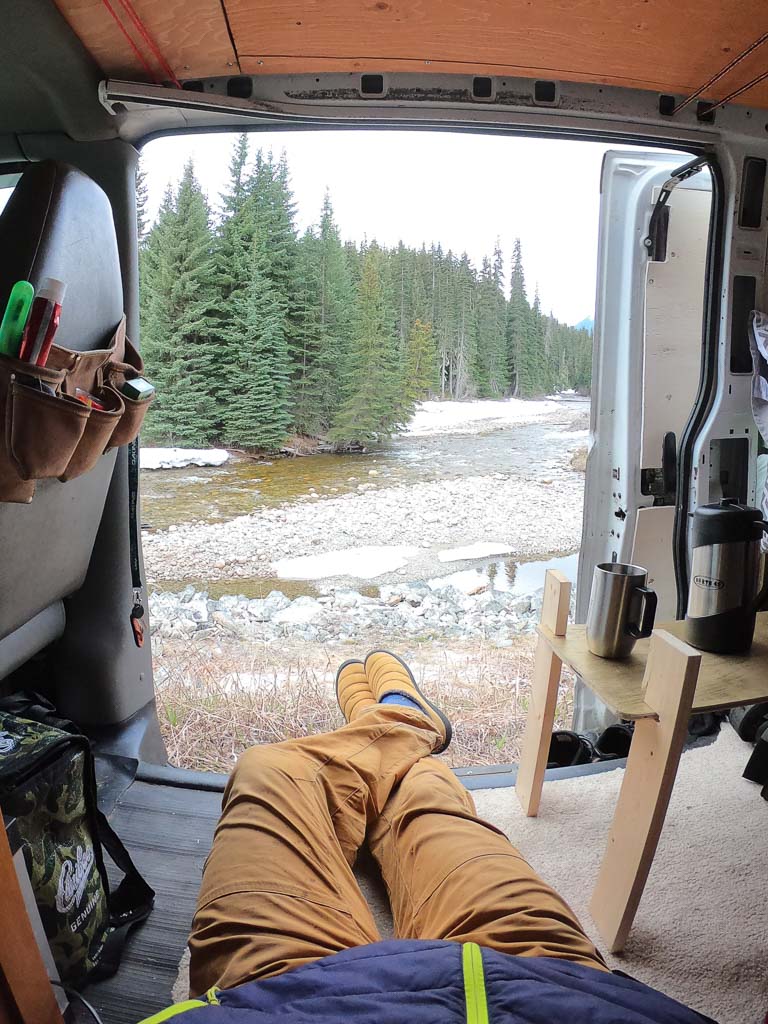
How Do You Exercise and Stay Fit on the Road?
An important part of any existence, but even more so when you are spending long hours driving or cramped up in the back of a vehicle. The question is though, how can it be done with such lack of space?
TLDR: go to the gym.
The benefits of the gym have already been covered on other points, such as showers and toilets, almost forgetting the main function of the gym. The fees are a small price to pay for feeling good and having access to facilities. Some nation wide gyms allow you to buy a membership to be used at any one of their locations, perfect for life on the road.
The traditional gym is some peoples idea of a nightmare. So here are some other options to help you avoid turning into a stinking sack of potatoes in the back of a Ford Transit.
Climbing Gym. Becoming increasingly popular around the globe. Climbing and bouldering gyms allow you to keep your fitness up in a more fun manner.
Yoga. The wilderness is the best place for it, so all you really need is a mat. A travel yoga mat will take up little space and insure you’ll always have a spot to practise without getting filthy. If you have no idea where to begin, download some youtube videos to get you started.
Calisthenics. or ‘body weight’ exercise. Simple movement using little or no equipment, mostly just your own weight as resistance. Again, lots of good information on YouTube and Reddit. I supplemented my bodyweight works outs by using resistance bands. There are certain muscle groups you can only work using a ‘pulling’ motion. So unless you have a van hang board, they can be a great investment to achieve all round fitness at a low cost.

Leave No Trace (LNT)
LNT are the most important principles for all outdoor adventurers to follow. It is a code of ethics designed to help steer you in the path of least disturbance when amongst nature.
If every person in the community followed these simple rules, we would move away from the devastating effect that humans are having in nature, and start to thrive alongside it.
The principles of LNT are as follows:
- Plan Ahead and Prepare
- Travel and Camp on Durable Surfaces
- Dispose of Waste Properly
- Leave What You Find
- Minimize Campfire Impacts
- Respect Wildlife
- Be Considerate of Others
More information on LNT can be found here.

Take some time to process the information given in this van life guide. Bookmark the page. Jot down some notes. Come back and reread. Have it on hand to help you through your first steps of living free on the road.
And if you have learnt something of value, you can say thanks by buying me a pint!

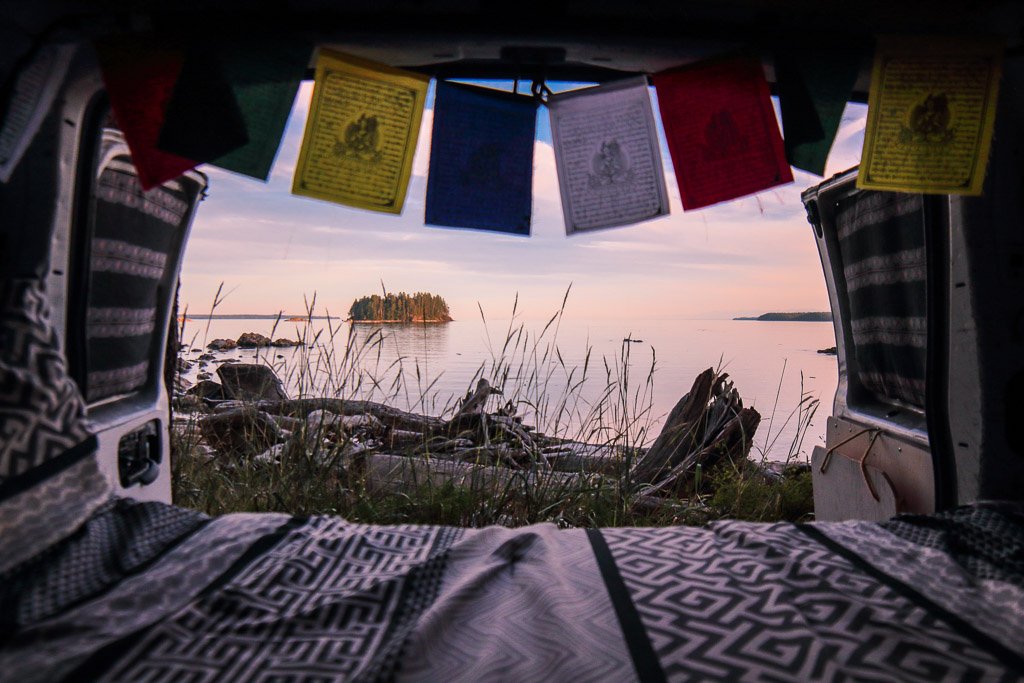
Pingback:Experience the Beauty of Van Camping: Your Ultimate Guide